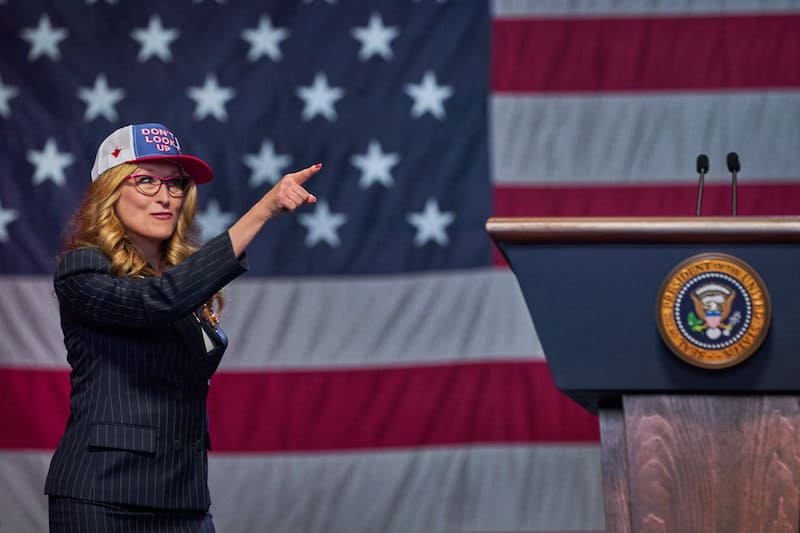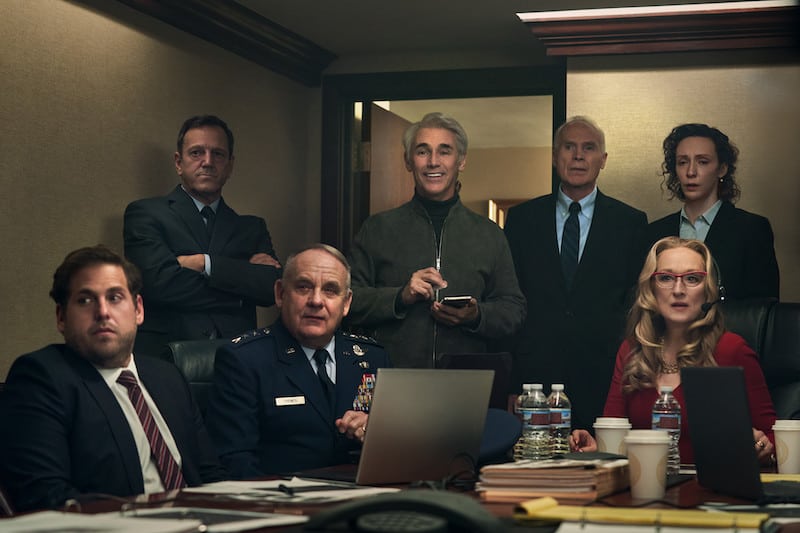
Real Stories is a column about the true stories behind movies and TV shows. It’s that simple. This installment focuses on the realities and uncanny true story underpinning Adam McKay’s Don’t Look Up.
Don’t Look Up, from writer-director Adam McKay (Anchorman, The Big Short) is not quite based on real events. But our insane reality certainly sits at the center of the movie. The plot follows two scientists, played by Jennifer Lawrence and Leonardo DiCaprio, who try to warn government officials and then the general public of an incoming asteroid that will destroy the planet.
The project began as an allegory for climate change, a huge concern for both McKay and DiCaprio. As explained in a recent profile in Vanity Fair:
The road to McKay’s latest movie began a decade ago, then McKay read a U.N. report in 2018 outlining the scientific consensus on climate change—and freaked out. “I couldn’t sleep for two nights after I read it,” he says. “I had one of those moments where I went from, ‘Hey, we gotta fucking take care of this, this is crazy,’ to ‘Holy shit. It’s happening now. It’s not 80 years from now, it’s now.’”
But, in the wake of the COVID-19 pandemic and the general chaos of our times, Don’t Look Up became more about the ways in which we as a society are fundamentally broken. Our society, McKay says, can no longer come to a consensus about anything. From the Vanity Fair article:
Within a month of production, the pandemic hit, and the world went into lockdown, followed by the harrowing presidential election, followed by the January 6 insurrection. The news kept italicizing the message of the movie. “I swear to you, I did not want ‘Don’t Look Up’ to be this topical,” McKay says. “I had to make it a little crazier. That was the big change. I think reality outflanked us.”
And so, this edition of Real Stories will look at the true events and people that inspired the story of Don’t Look Up. Oh, and there’s also an asteroid about to pass very close to Earth in the next couple of days. We’ll tell you about that, too.
No One Listens

Adam McKay has shown in his recent work that he is interested in systems. The Big Short uses the Great Recession to think about the failures of the financial system. Vice depicts the life of Dick Cheney to understand the federal bureaucracy and the erosion of public trust in government.
With Don’t Look Up, McKay turns his satirical sites on the mainstream media, indicting them for ignoring the climate crisis and focusing on more sensational topics. We need to look no further than McKay’s Twitter profile to understand his concern about climate change. “Climate Emergency is NOW,” it reads.
Cables news media figures as a central antagonist in Don’t Look Up. Just as McKay mocks politicians of both parties via the character of President Janie Orlean (Meryl Streep), he also critiques all three major cable news outlets: Fox News, CNN, and MSNBC. According to one recent study, 2020 saw the shortest amount of time dedicated to the climate crisis on the nightly and Sunday news shows since 2016.
Rather than pick the low-hanging fruit of Fox News, McKay’s main spoof in the movie is of Morning Joe, the popular MSNBC program. The show that we see in the movie, The Daily Rip, is hosted by Brie Evantee (Cate Blanchett) and Jack Bremmer (Tyler Perry). The former, Vanity Fair notes, is “as close to [Morning Joe co-host] Mika Brzezinski as one could get without being an impersonation.”
McKay’s indictment of the media extends to other venerated institutions, including the New York Times, which he also spoofs in the movie. His problem with the paper, he told Vanity Fair, is the way they treat the climate crisis like any other story:
Then again, if you’re a top editor at the paper, McKay ventures, “are you really going to go into a meeting and go like, ‘Hey guys, I think we should put a headline that says, ‘We’re fucked.’”
The Presidential Mash-Up in Don’t Look Up

From the moment we meet President Orlean in Don’t Look Up, it is clear she is a terrible president and person. The portraits of her predecessors that she presumably chose to hang on the walls of the Oval Office epitomize her lack of shame. One is of Woodrow Wilson, a racist who famously praised and screened The Birth of a Nation at the White House. Another is of Richard Nixon, who resigned in disgrace after the Watergate scandal.
The connections between the character of President Orlean and real-life former President Donald Trump are all too clear. The archetypal “celebrity president,” she won in part by her willingness to say and do anything. The Trump connection also extends to the fact that Orlean’s son, Jason (Jonah Hill), serves as her Chief of Staff. A clear nepotistic amalgamation of Ivanka Trump and Jared Kushner, Jason too only cares about power, money, and fame.
But in discussing the movie, McKay has been clear: Trump isn’t the only influence. And how could he be? What McKay unpacks in Don’t Look Up is the byproduct of decades and decades of political malfeasance and societal decay.
As the director recently explained to the Los Angeles Times, Orlean is “narcissistic and self-serving and shortsighted” like Trump, but far savvier. She has “the double-talk and the polish” of Bill Clinton, is “underqualified” like George W. Bush, who also gets a nod with Orlean’s speech aboard an aircraft carrier, contains “a little pinch of [Barack] Obama, his kind of smooth celebrity thing,” and the “empty suit performative kind of stuff” of Ronald Reagan.
McKay makes this all explicit in the movie when he cuts to a framed photo of Orlean embracing Clinton. A self-proclaimed Democratic-socialist, McKay has been clear: he holds the establishment of both political parties accountable.
The Real Comet of Cash Heading Towards Earth

Finally, here’s an ironic dose of reality for you: an asteroid is heading towards Earth right now. According to NASA (via Live Science), a “potentially hazardous” piece of space rock will enter Earth’s orbital path on December 11, 2021. Larger than the Eiffel Tower, the asteroid, named 4660 Nereus, is expected to “skim past” Earth at 14,700 MPH. Phew. But the asteroid is the closest call Earth has had in the last 20 years. Pretty spooky right?
Live Science notes the asteroid will be about 2.4 million miles away. That’s roughly 10 times the distance between Earth and the Moon. In space terms, that is quite close. NASA designates anything that comes within 120 million miles of the planet as a “near-Earth object.”
Scientists have tracked Nereus for decades, since 1982. The asteroid enters Earth’s orbital path once every decade or so.
But what makes the asteroid so interesting, especially as it relates to Don’t Look Up, is its perceived value. According to experts, the asteroid contains roughly $4.71 billion worth of rare metals.
Those familiar with the plot of Don’t Look Up will see a familiar story. Billionaire Peter Isherwell (Mark Rylance), figures as the movie’s chief antagonist. Without spoiling too much, I will simply say that Isherwell sees a lot of profit in Earth’s impending doom. A major donor to Orlean, he heavily influences presidential decision-making.
His objective? Mine the incoming comet to get access to rare metals he can then use to supply his technology company. He’s like a creepier, more evil version of Jeff Bezos, Elon Musk, and Mark Zuckerberg combined.
Similar to Dick Cheney in Vice or the bankers in The Big Short, Isherwell is all about himself and the bottom line. Space has consistently been a source of hope, inspiration, and wonder for humans. But now, as space travel becomes more and more real, capitalism has found its way in.
Space used to be about science and discovery. Now, just like Wall Street, and just like politics, it is all about the money. And that is one of the many harsh, dark realities at the center of Don’t Look Up.
Related Topics: Real Stories

